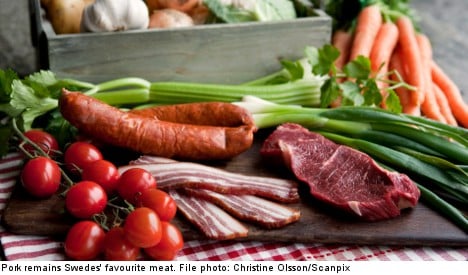Swedish meat consumption has increased by a third in the past 30 years, said the board’s review. Annually, the average Swede will eat more 85 kilogrammes of meat, with pork the most common product, followed by beef then poultry.
The consumption in Sweden is higher than the EU average.
Beef production in particular uses a lot of resources. Imported meat has an additional environmental impact due to transport, the agricultural board report noted.
“Our mandate includes looking at sustainable development and food production that benefits the consumer,” spokeswoman Gabrielle Cahlin said in a statement.
“We tried looking at the big picture for sustainable meat production.”
The report offered three solutions. Less meat consumption globally, the possibility of taxing meat, and international agreements to support sustainable meat production.
Finance Minister Anders Borg, however, ruled out specific meat tax, telling the Dagens Nyheter newspaper that he thought Sweden’s current carbon dioxide tax system worked well.
Agriculture and Rural Affairs Minister Eskil Erlandsson explained that the Sweden is considering removing certain exceptions to the carbon tax as part of a broader review of climate policy but that a specific tax on meat was “counterproductive.
“People should decide for themselves what they want in their refrigerator,” he told the TT news agency.
The Agricultural Board clarified later on Tuesday that it wasn’t actually proposing a carbon tax on meat.
“Rules, taxes, and subsidies can push things in the right direction. But it’s imperative that these are at an international level, otherwise there is a risk production will simply be moved where the regulations and tax burden is lightest, not where production is sustainable,” Gabriella Cahlin, the board’s head of marketing, said in a statement.
TT/The Local/at



 Please whitelist us to continue reading.
Please whitelist us to continue reading.
Member comments